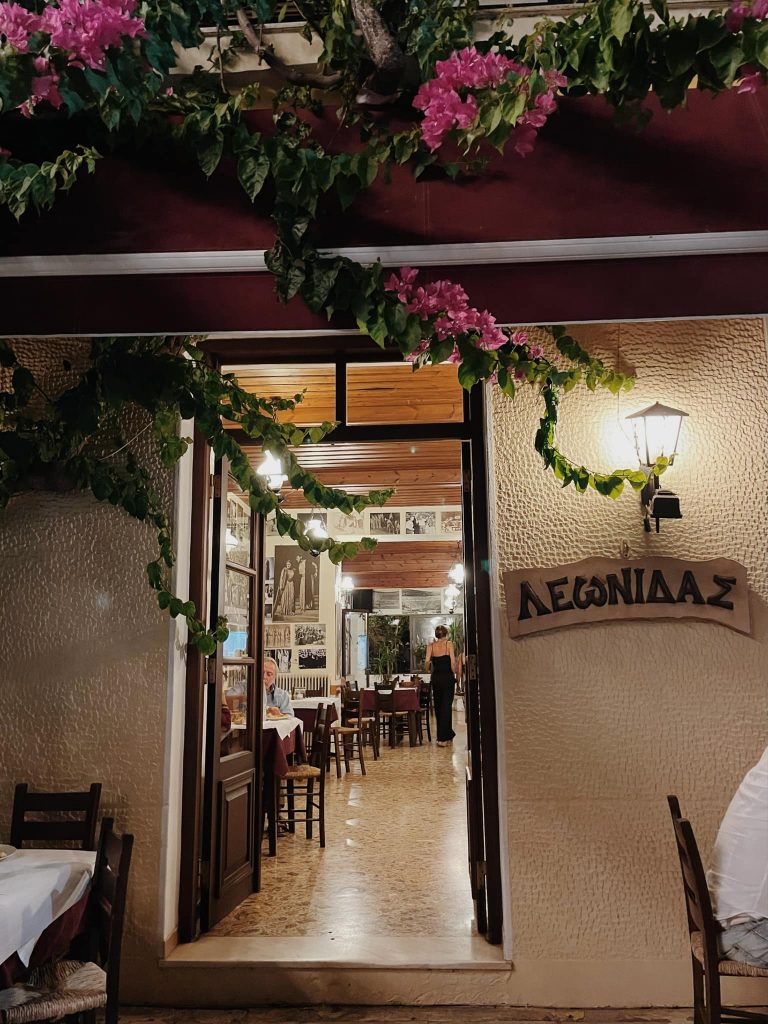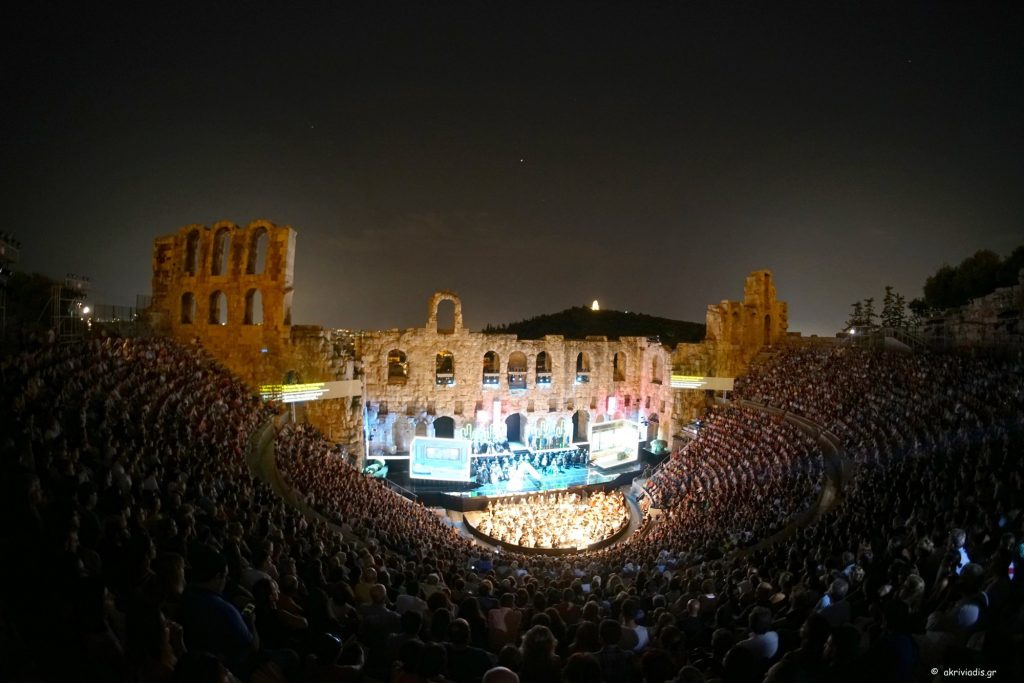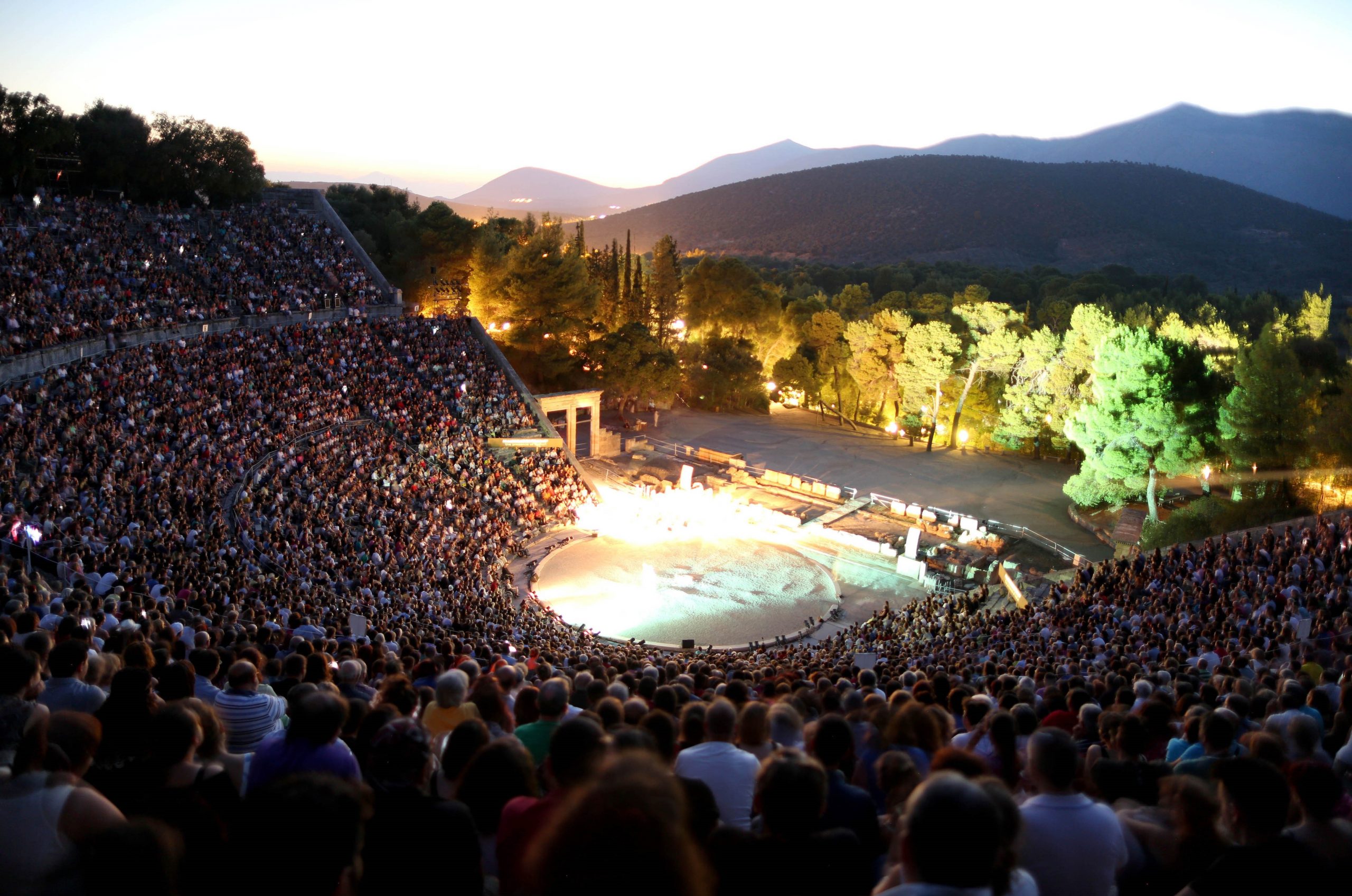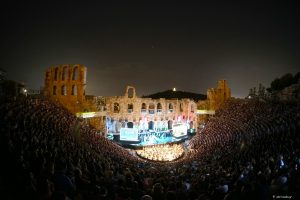Nestled on the southeastern edge of the sanctuary dedicated to Asclepius, god of medicine, and set amidst lush greenery just a two-hour drive from Athens along the coast of Argolis in the Eastern Peloponnese, lies the cradle of ancient Greek theater: the Ancient Theater of Epidaurus. Built in the late 4th century BC, this UNESCO World Heritage Site is considered the finest ancient Greek theater in terms of aesthetics and acoustics.
The first modern performance at the unearthed and restored theater was Sophocles’ Electra in 1938. However, it was in June 1955 that Euripides’ Hecuba, directed by Alexis Minotis and starring the Oscar-winning Katina Paxinou, marked the official launch of the Athens-Epidaurus Festival, Greece’s foremost public cultural institution.
Since then, the Ancient Theater of Epidaurus has hosted high quality, artistically significant theatrical productions featuring the biggest names from the Greek and international stage, including the diva herself, Maria Callas.
For many Greeks, attending performances at this iconic venue is a long-standing summer tradition. Recent years have also seen foreign visitors availing themselves of this unique experience, too, now that English surtitles are provided for the majority of productions.
International Productions: Iphigenia in Aulis Opens this Season
The Epidaurus part of this year’s Athens-Epidaurus Festival opens with Iphigenia in Aulis on July 5 and 6. In this collaborative international production, internationally acclaimed Russian director Timofey Kulyabin works with a talented Greek cast.
“We began a bridging project last year, inviting foreign directors to bring their own perspective to the ancient Greek repertoire alongside Greek artists. We hope that this exchange and collaboration will enrich the Greek theater and artistic community with creative resources and give the audience the opportunity to enjoy exceptional performances,” stated Katerina Evangelatos, artistic director of the Festival, during a press conference.
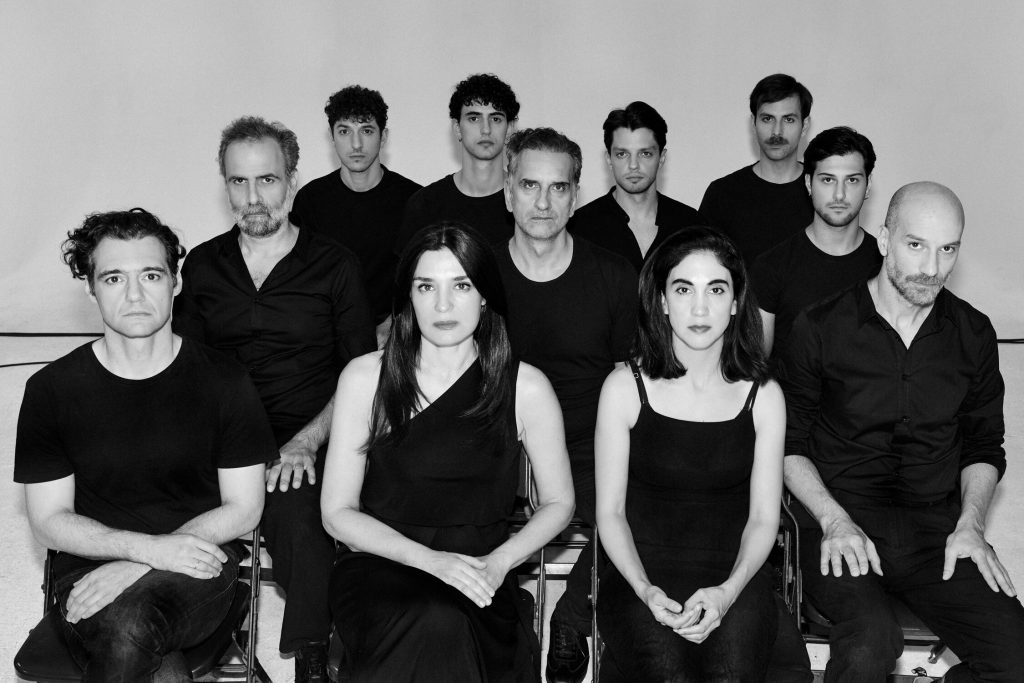
Athens Epidaurus Festival, Iphigenia in Aulis. @ Alex Kat Gallery
Iphigenia in Aulis takes place in the port of Aulis in Ancient Boeotia in Central Greece, where the Achaeans -one of the four major tribes into which Herodotus divides the Greeks- have gathered to sail to Troy and retrieve Helen of Troy, abducted by Paris. However, poor winds impede their departure. According to the prophet Calchas, the winds will only get stronger until Agamemnon offers his daughter Iphigenia as a sacrifice to the goddess Artemis.
“To start a war, you need sacrifices,” Kulyabin explains, adding “The fundamental theme of the play is war. We don’t see battles, but we feel the impending war. Everything is ready: the troops, the weapons. Only a small push is needed to set it off. It is interesting to see how this translates today. In the play, the question is not whether there will be a war, but when. For me, everything is about the ‘technologies’ of war, the politics and the media. Today, unfortunately, war is present once again in our lives. Paradoxically, despite historical experience, we humans do things we thought would never happen again.”

Timofey Kulyabin ©Alex-Kat
Hecuba, not Hecuba is another international project in this year’s itinerary. Directed by Portuguese director and new head of the Avignon Festival Tiago Rodrigues, performances are scheduled for July 26 and 27. The play is inspired by Euripides’ Hecuba and is part of an ongoing collaboration with the Avignon Festival that has brought the Comédie Française back to Epidaurus for a second time, the first being in 2019.
In Rodrigues’ play, ancient drama blends with the tale of a contemporary heroine, as two women – Hecuba, Priam’s widow who has lost everything with the fall of Troy, and a modern mother whose autistic teenager son has been abused by the institution entrusted with his care—embark on a quest for justice.
According to Evangelatos, both of the international productions brought to Epidaurus this year by leading European directors are “of exceptional significance to the festival. ”In her interview with TO VIMA, she describes the festival as “a celebration of (various) opinions and different perspectives.”
Democracy, Justice, Inclusion: The Timeless Themes of Ancient Greek Tragedy
“This year’s performances adopt a political perspective, in that they focus on the challenges of coexisting in contemporary societies: the demands for Democracy, Justice and Inclusion, as well as the urgent need to engage in civic life,” Evangelatos notes.
The Oresteia, scheduled for July 12–13, illuminates these themes. Its renowned director Theodoros Terzopoulos invites us to ponder, “Why does the Oresteia continue to hold such tremendous attraction?” He suggests, “It might be because we humans seem to have an intrinsic need to connect with Myth on a profound level. The myth of the Oresteia is dangerous: it belongs to the world of the uncanny and the strange and evokes terror by revealing the most deeply-rooted laws in all their unbowed and unbridled violence.”
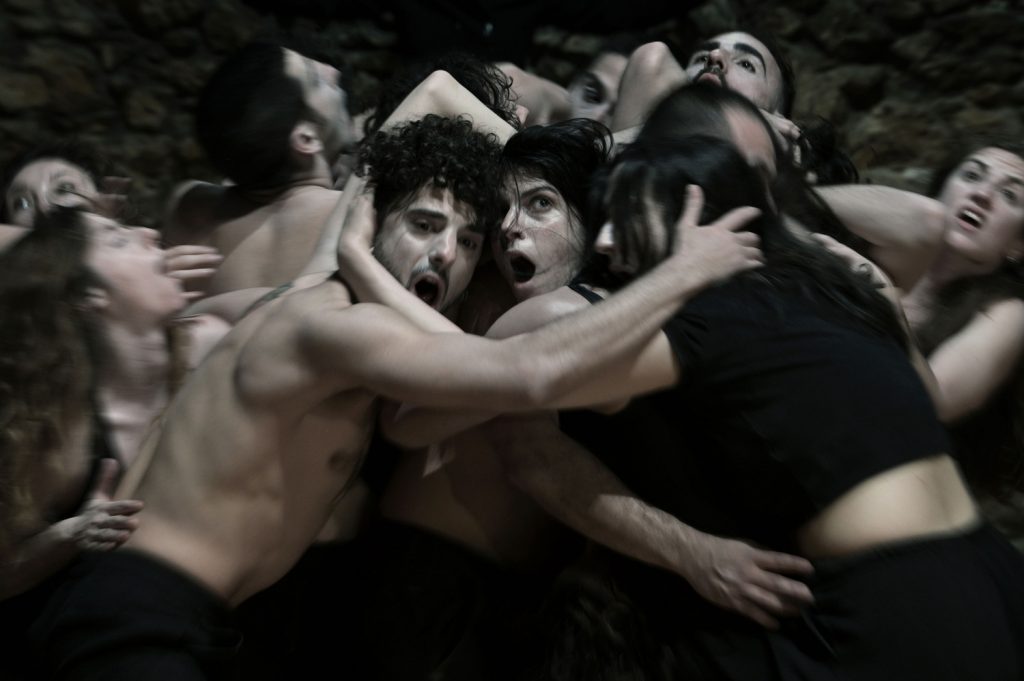
Theodros Terzopoulos “Oresteia”, National Theater of Greece
@Γιοχάνα-Βέμπερ
Acclaimed as the only trilogy to have remained intact from antiquity, Aeschylus’ play is one of two productions put on by the National Theater of Greece this year. The other is Euripides’ Bacchae, scheduled for August 2–3.
Equally relevant is Aristophanes’ comedy Plutus (Wealth), a satirical take on contemporary Athens featuring the homonymous god of wealth, scheduled for July 19–20. According to its acclaimed director, Giorgos Kakleas, “In his uniquely satirical way, the ancient poet shows us a way to manage material goods in a way that maintains a balance with the common good. Is a Polis with just, honest and virtuous citizens simply a utopian vision? Perhaps. But Aristophanes retains the right to dream!”

Athens Epidaurus Festival 2024, Plutus,
@Mike Rafail
In the same vein, another Aristophanic comedy, The Birds, set for July 9–10, features two Athenian friends, Pisthetaerus and Euelpides, who want to leave the human world behind and find a city free from pettiness and corruption, where one can live in peace and justice.
Finally, inclusion and asylum in a democratic society take center stage in Aeschylus’ The Suppliants, which Marianna Calbari will be directing on July 23–24. The play features a female Chorus comprised of fifty Danaids who, along with their father King Danaus, flee Africa and seek asylum in the city of Argos.
More Than Just a Theater
Thanks to its proximity to Athens, Epidaurus is the perfect destination for a day trip or weekend getaway. As the route becomes especially scenic after Loutra Elenis, the air is redolent with the scent of pine. The “Epidaurus experience” includes a beautiful walk through the archaeological site, a sunset viewed from the tiers of the theater, and the magical silence just before the performance begins. “It’s a unique space, with its own laws and its own energy,” says Kulyabin, who declares himself enthused and grateful for the opportunity to work in the Ancient Theater of Epidaurus.
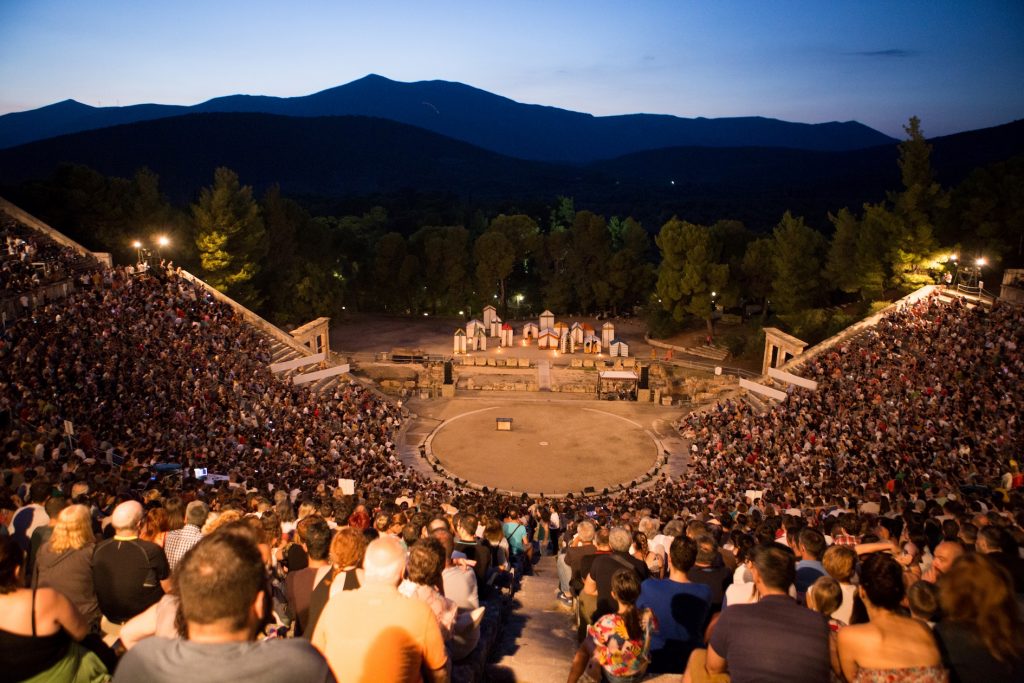
At the end of each performance, visitors traditionally discuss their impressions in the tavernas of the nearby village of Ligourio, where performers, artists and audience interact around the dinner table. “Leonidas”, a traditional tavern that started out as a café in 1953, became the actors’ official tavern in 1954 and now operates as a living museum. Among the photographs that adorn its walls, visitors can make out the faces of some of the greatest names in the history of Greek theater, as well as prominent figures including Melina Mercouri, Harvey Keitel, Helen Mirren, François Mitterrand, Ethan Hawke, Leonard Bernstein, Pina Bausch, Maria Callas, Peter Hall and Kevin Spacey.

Left to Right: Leonidas Liakopoulos owner of “Leonidas” tavern, American actor Harvey Keitel and Thodōros Angelopoulos
Greek filmmaker and screenwriter Theodoros Angelopoulos.

Greek cinema and theater actress Aliki Vougiouklaki and Kakia Liakopoulou, present owner of the legendary tavern.
